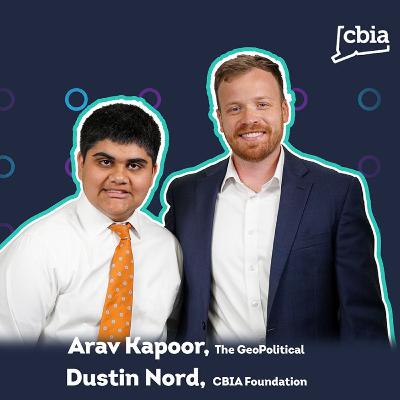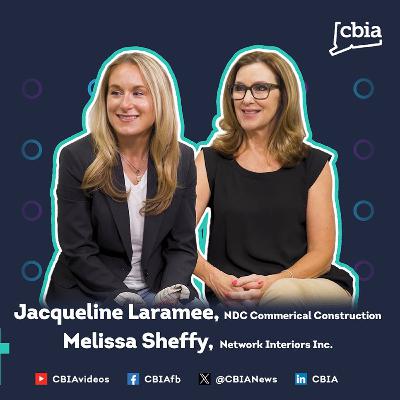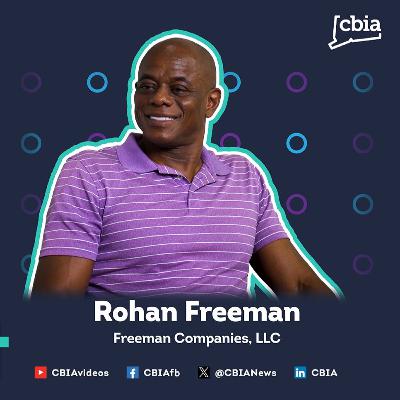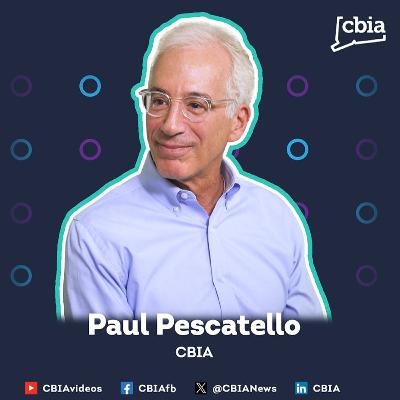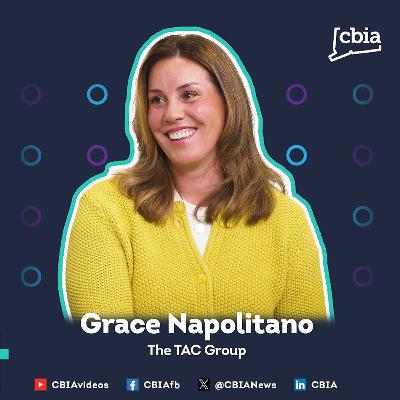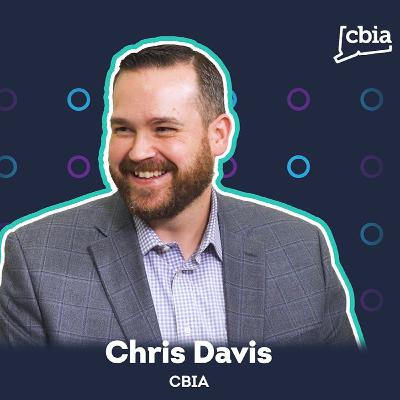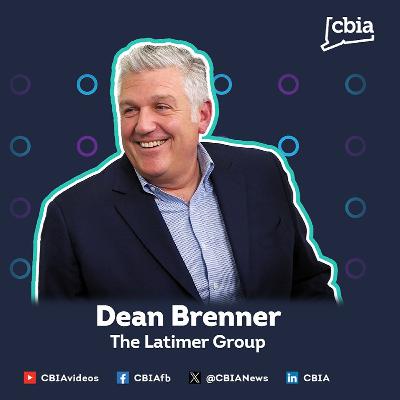Discover CBIA BizCast
CBIA BizCast

CBIA BizCast
Author: Connecticut Business & Industry Association
Subscribed: 1Played: 55Subscribe
Share
© All rights reserved
Description
A podcast for the business-minded in Connecticut. Interviews consist of business and community leaders who are shaping the future of Connecticut’s economy. The CBIA BizCast provides new content every other week, introduces members of the business community, and tells stories about how businesses are innovating and growing in Connecticut!
BizCast provides new content every other week, introduces members of CBIA staff, and tells stories about how businesses are innovating and growing in Connecticut!
BizCast provides new content every other week, introduces members of CBIA staff, and tells stories about how businesses are innovating and growing in Connecticut!
231 Episodes
Reverse
The Girl Scouts have always held a special place in Elicia Pegues Spearman’s life.
“My mother was a Girl Scout Brownie when she was growing up,” Pegues Spearman told the CBIA BizCast. “I was a Brownie here in Connecticut, and my daughter was a Girl Scout, and I was a coach, troop leader.”
Despite that history, Pegues Spearman never imagined leading Girl Scouts of Connecticut.
“I’ve enjoyed my career as a lawyer,” she said. “I’ve had a really good career.”
Her career included legal counsel and HR roles at the State of Connecticut, the FBI, Aetna, Hubbell Incorporated, General Dynamics Electric Boat, and Quinnipiac University.
She reconnected with Girl Scouts in 2022 when she received a Breakfast Badge, an award honoring woman for community contributions.
She stayed in touch with the then-CEO and, in 2024, became CEO herself.
“The Girl Scouts is a lot of fun,” she said about making the career shift. “I don't like to be bored.”
While cookies often come to mind when you think of the Girl Scouts—it’s the organization’s biggest initiative teaching entrepreneurship, customer service, and money management—the organization’s purpose runs deeper.
“We are more than cookies, camps and badges,” Pegues Spearman said.
“Our whole mission is to build girls of confidence, character, and courage.
“To do that, we have many programs and skill building that build leadership development that our girls are involved in.”
Pegues Spearman said the Girl Scouts of Connecticut focus on outdoor skills, life skills, business skills, and STEAM education.
Pegues Spearman highlighted Camp Sikorsky and Camp CEO as examples of programs that give girls experiential learning opportunities.
The Girl Scouts of Connecticut focus on outdoor skills, life skills, business skills, and STEAM education.
“I just feel like we're giving them the secrets to success earlier on in their lives,” Pegues Spearman said.
“They kind of have a roadmap about what it means to be successful.”
One of the best parts, she said, is watching girls interact and grow in confidence.
“Seeing that sparkle in their eye and that like, ‘wow, I just did that,’” she said.
As the leader of a nonprofit, Pegues Spearman said being successful means navigating challenges.
“I think the biggest challenge is obviously resources. We're a nonprofit. We have tight budgets, and we depend on volunteers,” she said.
Pegues Spearman credits her team of paid employees and volunteers for the success of the organization.
“My staff loves our mission, and we work every day with that mission in mind,” she said. “It's easy when you’re supporting youth.”
As part of its mission, the Girl Scouts of Connecticut is working to expand access for girls of all abilities and backgrounds, with a special focus on underserved communities.
“We want all girls of all abilities to be able to access Girl Scouts,” she said.
In addition to her role with the Girl Scouts, Pegues Spearman serves as the North Atlantic Regional Director of Alpha Kappa Alpha Sorority.
The sorority is the oldest Greek-letter organization established by African American college-educated women.
Pegues Spearman said she finds natural alignment between her work with the sorority and her role with the Girl Scouts.
“Being the leader of the Girl Scouts, going to an all-women’s college, being in an all-women’s sorority—it's natural for me to be involved with girls and youth,” she said.
“This is my special passion—to mentor girls and have them be their best and have them try things they would have never tried.”
Related Links:
Girl Scouts of Connecticut
Website: https://www.gsofct.org/
LinkedIn: https://www.linkedin.com/company/gsofct/
Elicia Pegues Spearman LinkedIn: https://www.linkedin.com/in/eliciaspearman/
CBIA
Website: https://www.cbia.com/
LinkedIn: https://www.linkedin.com/company/cbia/
If you ask Omar Coffee CEO Nicolas Bokron how to run a successful, fourth-generation business, he’ll tell you about the core values posted on the walls around his company.
“Trust, not tricks” is one of them.
“Generally, the coffee business is about on-going relationships, so it’s very important to take care of issues and make them right,” Bokron said.
“People need to trust and rely on you.”
Bokron recently sat down to talk about all things coffee—and his family’s always-evolving 88-year-old business—with first-time CBIA BizCast guest host Ari Santiago, well-known for his Made in America podcast series.
Founded in 1937 by Bokron’s great-grandfather John Costas, Omar Coffee started in Hartford’s South End.
Over the years, it gradually grew into a regional company that roasts raw coffee beans, then sells, packs and distributes them to customers throughout the Northeast and beyond.
Omar also provides and services coffee brewing equipment for food service establishments.
On the retail side, Omar sells its coffee online.
“We’ll give you everything you need to get set up and get brewing so you can sell coffee by the cup,” Bokron said.
In line with its business culture and family values, Bokron says when it comes to hiring new employees, the first thing the company looks for is character.
“If someone has the right attitude, shows up at the right time, day in and day out, and they’re reliable, then we’ll try to give them the appropriate skills, whether its manufacturing, sales, or service,” he said.
The family’s values and strong culture built on hard work and integrity run deep at Omar.
“We’re big believers of training from within,” he said.
“There are people who work at Omar now whose parents worked for my grandfather.
“They share the same connection and affinity to the business because it means more to them than just a job.”
When it comes to keeping a family business evolving with the times—and staying competitive regardless of industry trends—Bokron said he’s learned to maintain a long-term perspective.
“My grandfather taught me you just sort of have to remain steady,” he said.
“Good things are going to happen, and bad things are going to happen.
“So I feel like it’s my responsibility to take the information in, try to solve the problems, and remain cool, calm and collected.
“I mean after all we’re making coffee here. We have to remain steady because we have a long-term focus.”
Related Links
Omar Coffee
Website: https://www.omarcoffee.com/
LinkedIn: https://www.linkedin.com/company/omar-coffee-company/
Nicholas Bokron LinkedIn: https://www.linkedin.com/in/nicholas-bokron-09a0a823/
Made in America Podcast: https://www.youtube.com/c/MadeinAmericaPodcastwithAri
Made in America Podcast LinkedIn: https://www.linkedin.com/company/made-in-america-podcast-with-ari/
Ari Santiago LinkedIn: https://www.linkedin.com/in/asantiago104/
CBIA
Website: https://www.cbia.com/
LinkedIn: https://www.linkedin.com/company/cbia/
The CBIA BizCast is made possible through the generous support of Google. Please rate, review, and subscribe to the BizCast wherever you get your podcasts—we appreciate your support! If you have a story to tell, contact Amanda Marlow.
The CBIA BizCast is turning the tables a little.
In June, Fairfield Woods Middle School Arav Kapoor was the runner-up in the National Civics Bee Connecticut State Finals, narrowly edged out by Tomlinson Middle School's Aarav Pradeep Sahu.
The annual competition aims to improve civics education and literacy among middle school students, their families, and communities.
The CBIA Foundation hosts the Civics Bee in partnership with the U.S. Chamber of Commerce Foundation and local chambers across Connecticut.
Kapoor has his own podcast, The Geopolitical, where he discusses politics, policy, and more with a variety of state and municipal leaders.
In this special crossover episode, he sits down with CBIA Foundation director Dustin Nord to talk about the foundation, Connecticut’s economic future, the state’s political landscape, even the best pizza in the state.
We’re excited to share the episode with you.
Related Links:
Arav Kapoor
YouTube: https://www.youtube.com/@tgpnow
Arav Kapoor LinkedIn: https://www.linkedin.com/in/aravka/
CBIA Foundation
Website: https://www.cbia.com/foundation/
LinkedIn: https://www.linkedin.com/company/cbia-foundation/
The CBIA BizCast is made possible through the generous support of Google. Please rate, review, and subscribe to the BizCast wherever you get your podcasts—we appreciate your support! If you have a story to tell, contact Amanda Marlow.
Jacqueline Laramee didn’t realize it at the time, but the course of her life and career trajectory shifted when—while still in high school—she met Melissa Sheffy.
“When I met her, I didn’t know that I was meeting my future boss, my future business partner, my future best friend,” Laramee, now president of Plainville-based NDC Commercial Construction, told the CBIA BizCast.
“It was just kind of like, the universe is setting me up.”
Larmaee and Sheffy, then president of Network Interiors and Network Framing Solutions, first met as members of a local YMCA board—Laramee as a high school representative.
Sheffy said she saw something special in Laramee almost immediately, recalling a conversation about where she planned to go to college.
“’It doesn’t matter where I graduate from,’” Sheffy recalled Laramee saying. “’My college isn’t going to make me successful. I will make me successful.’
“That stuck with me, because I was like, ‘this one is different.’
“I’ve had a lot of young people over the years, and I tell people, ‘I’m going to hire you, and I’ll create an opportunity, but you have to run through the holes that I create on the field.’
“She was the first to really kind of break the mold.”
Sheffy started Network Interiors—a commercial metal framing and drywall company—about 34 years ago.
At the time, it was one of the few 100% women-owned companies in a male-dominated industry.
“It was different than it is now,” Sheffy said. “There still are not enough women, as far as I’m concerned, but it’s become a lot more professional.”
During the 2008-2012 economic downturn, Sheffy saw the need to diversify, eventually launching Network Design and Construction and later branching off NDC Commercial Construction in 2016.
Laramee joined Network Design and Construction in 2008 while still in high school.
“I just said, ‘I want a job that I can work with people’,” Laramee recalled.
“I want a job that I could do anywhere, and I want a job that I can learn something new every day.”
That’s when the mentor-mentee relationship began.
During that period, Laramee worked multiple jobs while going to school full-time.
“I’m not the smartest person,” Laramee said. “But I will work and work and work.
“There’s no shortcut, no hack. You can’t replace hard work.”
Over the years, Laramee and Sheffy became closer as they spent more time together.
“Melissa helped raise me,” Laramee said. “We spent a lot of time driving to job sites, just bonding and being there for each other.”
Laramee continued to grow with the company, becoming president of NDC Construction in 2024.
“It was a true mentor-mentee situation,” Sheffy said. “I trusted her.
“She always had my and the company’s best interest at heart, and her level of honesty and integrity is very similar to mine.”
Laramee, who was elected to CBIA’s board of directors last year, said one of the biggest lessons she learned from Sheffy was to engage with people at every level.
“I love that connectivity,” Sheffy said. “We’re building buildings, but we’re building relationships.
“So people matter to me, and I think that’s different.”
As their relationship has grown, both women said they’ve helped each other step outside their comfort zones to develop as business leaders.
“I’ve converted her to systems and processes,” Laramee said. “She has converted me into being a hugger and being open.”
Sheffy said their relationship has now come full circle—where she is learning from Laramee.
“The sign of a good teacher is that the student surpasses the teacher,” Sheffy said. “That’s what’s happening here, and that’s exciting.”
“I get to work with some of the most amazing, talented people,” Laramee said.
“I love learning from them, and I think that that’s what keeps life interesting—we get to learn every day if we want to.”
Related Links:
Melissa Sheffy: https://www.linkedin.com/in/melissasheffy/
Jacqueline Laramee: https://www.linkedin.com/in/jacqueline-laramee-1aa02544/
Over the past 10 years, Middletown-based AI Engineers has more than tripled in size.
The architecture, construction, and engineering firm has grown from 90 employees to 350 in the U.S., with an additional and 70 employees working overseas.
And annual revenue from $18 million to $77 million.
Now factor in the speed of technological change, the challenge of finding qualified new employees, and the need to manage a multi-generational workforce.
So how does a mid-sized company navigate that much change successfully?
“We’re known for agility and rapid decision-making,” Tariq Islam, AI Engineers’ new chief of staff, said during a conversation on the CBIA BizCast.
“So we’re able to react a lot quicker than a lot of other organizations, and that kind of sets us apart for a company of our size—our ability satisfy the customer.”
“Plus, we’re always looking for new technology to implement quickly. We leverage partnerships to find qualified engineers and we’re very focused on succession planning,” he added.
Seven years ago, the company established a group of 15 people to look for new technology from start-ups, pilot programs, and places outside their industry.
“We were early investors in drones,” said Tariq’s father Abul Islam, who founded the company in 1993.
“We’re always looking for new trends and ways to create operational efficiencies.” With new technology comes a new workforce with new skills, Tariq said.
To find qualified civil engineers, the company partners with academic institutions to attract graduate and international students.
They also rely on statewide resources, including support from CBIA on immigration licenses.
“We have a whole program in place for helping engineers from overseas get their Connecticut licenses, as well as licenses in other states,” Abul Islam said.
“It doesn’t matter where they get their degrees from, it’s the war of talent right now.”
And as it seeks out new technology, the company tries to recruit employees from startups and pilot programs.
“We’ve been successful at recruiting people as we find new technology,” Tariq Islam noted.
The challenge of connecting different generations of employees is one that the company has taken head on.
“A lot of institutional knowledge comes from the employees of my father’s generation,” Tariq Islam said.
“And there’s a collaborative spirit that the younger generation brings—they have different styles of working.”
Bridging the knowledge and technology gap is a process that takes time, father and son agreed.
But sometimes innovation comes from a simple place.
“You basically have to get everybody into a room and let them talk to each other so they can understand different perspectives,” he said. “Then it happens.”
Related Links:
AI Engineers
Website: https://www.aiengineers.com/
LinkedIn: https://www.linkedin.com/company/ai-engineers-inc/
Abul Islam LinkedIn: https://www.linkedin.com/in/abulislam/
Tariq Islam LinkedIn: https://www.linkedin.com/in/tislam410/
CBIA
Website: https://www.cbia.com/
LinkedIn: https://www.linkedin.com/company/cbia/
The CBIA BizCast is made possible through the generous support of Google. Please rate, review, and subscribe to the BizCast wherever you get your podcasts—we appreciate your support! If you have a story to tell, contact Amanda Marlow.
Since it was formed in 2023, the CBIA Foundation for Economic Growth & Opportunity has focused on charting a course for sustained economic growth in Connecticut that leads to greater opportunities for all residents.
Foundation director Dustin Nord joined the CBIA BizCast to discuss the organization’s mission and growth.
Nord joined the foundation in September 2024.
“The foundation presented a really cool opportunity to have that platform to look at and see, what are the areas that that Connecticut can be better,” Nord said.
“Where can we make tangible recommendations to be a better state?”
Nord previously worked at AdvanceCT and has a passion for economic data and research.
“It’s a little bit like magic, the things that come out of the data,” he said. “And it's just the opportunity to help other folks see what I see in that data.”
Nord joined the foundation around the same time the organization released its Opportunity Connecticut report.
The report is a long-term roadmap for boosting the state’s competitiveness, retaining and attracting investment and talent, fostering innovation, expanding career pathway opportunities, and growing a vibrant economy.
He said a key to the report's success is ensuring that it’s a living document.
“I think that's where previous reports fell short,” he said.
“What we're hoping that we can maintain with Opportunity Connecticut is that continual improvement.”
Nord said that while the foundation is focused on long-term thinking and doesn’t advocate for any specific legislation, nearly two-thirds of the recommendations in Opportunity Connecticut have seen some kind of an update so far.
Those include efforts this past session to address critical issues like energy, housing, and regulatory reform.
“I feel confident that the Opportunity Connecticut report helped start some of those conversations, and push those conversations in a in a bipartisan, cooperative way,” he said.
As part of effort to track and update the foundation’s research, Nord has spent much of the last year diving deeper into the impact of issues including tariffs and the state’s housing shortage on the Connecticut economy.
The foundation this month released its new By the Numbers: Tracking Connecticut’s Economic Competitiveness reference guide.
The resource tool details key economic data points and trends, highlighting where Connecticut compares with other states in critical areas.
And a key area of focus is the state’s labor force.
“Everybody has a labor shortage around the country right now, but Connecticut is acute," he said.
"I think we're seeing that in the data in terms of persistently high job openings and very low unemployment.”
Nord said that while his research is based on data, it’s also important to have anecdotal information.
The foundation holds forums and roundtables throughout the year to gain insight from stakeholders including business, nonprofit, and education leaders.
“Some of that anecdotal information helps inform where to look,” he said.
“It helps inform what, what types of data points do I need to look for.
“If there is data to support what people are feeling, then I want to be able to show that.”
Nord said that while the research he and the foundation are doing is a critical piece of improving the state’s economy and creating new opportunities for residents, it requires buy-in from everyone.
“While we can provide a lot of great research, and I can provide a lot of great forums, and I can give ideas to the advocacy team—ultimately, this requires people to participate in in our processes here in Connecticut.”
“If they want to make their voices heard, then I then I encourage them to do that.
“And I hope that this helps inspire some people to do that.”
Related Links:
CBIA Foundation
LinkedIn: https://www.linkedin.com/company/cbia-foundation/
Dustin Nord LinkedIn: https://www.linkedin.com/in/dustin-nord-ct/
CBIA
Website: https://www.cbia.com/
LinkedIn: https://www.linkedin.com/company/cbia/
Voting in the 2025 Coolest Thing Made in Connecticut challenge is underway!
The challenge celebrates the successes of the vital manufacturing industry and highlights the wide range of products produced by our world-class, highly skilled workforce.
Featuring 16 Connecticut-made products, the single-elimination, bracket-style competition allows the public to vote on their favorite product.
This special episode of the CBIA BizCast shines a spotlight on these amazing companies, the cool things they make, and their incredible workforces.
The companies in this year’s challenge are:
• American Woolen Company American Blazer : https://americanwoolen.com/
• Amodex Stain Remover: https://amodexusa.com/
• Beekley Medical Elequil Aromatabs Aromatherapy : https://beekley.com/
• Bic Consumer Products Lighter: https://us.bic.com/en_us
• Element 119 System X Max G+ Ceramic Coating : https://www.element119.com/
• Ensign-Bickford Aerospace & Defense Frangible Joint : https://ebad.com/
• Fascia’s Chocolates Chocolate Lava Cake: https://faschoc.com/
• Horst Engineering & Manufacturing Co. Horst Dreidel: https://horstengineering.com/
• Munson’s Chocolates Pecan Caramel Patties: https://www.munsonschocolates.com/
• Naiad Dynamics Fin Stabilizer : https://www.naiad.com/
• Oma’s Pride Woof Compete Recipes Dog Food : https://omaspride.com/
• Owl’s BrewOwl’s Brew Boozy Beverage : https://www.theowlsbrew.com/
• Rose Sisters Chips Baked Flour Tortilla Chips: https://www.rosesisterschips.com/
• Thule ReVert Bike Rack: https://www.thule.com/en-us/
• Urban Mining Pozzotive Glass Concrete: https://pozzotive.com/
• ZANEEZ HealthAnkleStone: https://anklestone.com/
The Coolest Thing Made in Connecticut is produced by the CBIA Foundation in partnership with CONNSTEP and made possible through the generous support of CliftonLarsonAllen LLP, Image Marketing, Blue Back Square, Medtronic, the Connecticut Office of Manufacturing, and Forge.
The winner will be announced at the Oct. 2 Made in Connecticut: 2025 Manufacturing Summit.
After the competition, the Connecticut Science Center will open an exhibit Oct. 10 celebrating the 2025 Coolest Things Made in Connecticut.
State lawmakers approved sweeping regulatory changes during the 2025 legislative session to replace the antiquated Transfer Act with new release-based cleanup regulations.
When the new regulations take effect March 2026, it will be the culmination of years of collaboration between key stakeholders, including CBIA member companies, the Department of Energy and Environmental Protection, and Department of Economic and Community Development.
“It had to be a partnership between the business community and state agencies to get this done,” says CBIA’s Pete Myers.
Myers and Robinson+Cole’s Emilee Mooney Scott joined the CBIA BizCast to break down the regulations and why the shift will have a positive impact on the state’s economy.
Mooney Scott said conversations around replacing the Transfer Act have been ongoing since she joined Robinson+Cole in 2011.
She said the Transfer Act required filings and costly environmental investigations when owners tried to transfer ownership of their property.
“An enormous amount of time and money goes into that evaluation,” she said.
She added that the process is onerous and inefficient and “chills economic development and real estate transactions.”
Under the new regulations, Mooney Scott said contamination must be investigated and remediated when a release occurs.
“So, if you kick over a drum—it occurs today, or when a past release is discovered,” she said. “There’s no particular requirement to go out and prove a negative.”
Connecticut based the new regulations in part on a similar system already in place in Massachusetts.
“We’re a different state than Massachusetts,” Myers said. “But it was certainly a roadmap that we wanted to follow.
“How can we be similar to states around us, but yet still be more competitive in those states around us?”
Myers said the updated regulations will help promote economic development, particularly in cities and downtown areas.
“You’re going to see a tremendous amount of sites become available in our downtowns, like Waterbury and Danbury, that are now available for economic development,” he said.
Myers and Mooney Scott said it was important that the state and the regulated community keep making the program better.
Because of that, the working group that’s been part of the effort to create the new regulations will continue to provide input into the program.
“We’ve been building this shiny new vehicle, but we won’t really know how it drives until we take it for a spin,” Mooney Scott said.
“And we’re not taking it for a spin until March 1. So, it is a huge relief that there is this feedback mechanism in place to evaluate how it drives.”
As businesses prepare for the new system, Mooney Scott plans to do a video series with Robinson+Cole to help them understand the regulations.
Mooney Scott and Myers encouraged businesses who are either working through the Transfer Act or planning to use the new release-based cleanup regulations to share their feedback through CBIA’s E2: Energy & Environment Council.
“Members of the business community can be a bit reluctant to raise their own hands and say, I am having this problem,” Mooney Scott said.
“E2 can take that feedback and pass it up in a way that helps the individual members.”
“It’s a tremendous resource to have access to people like Emily and the rest of our members,” Myers added.
Related Links:
Robinson+Cole
Website: https://www.rc.com/
LinkedIn: https://www.linkedin.com/company/robinson-cole-llp/
Emilee Mooney Scott LinkedIn: https://www.linkedin.com/in/emilee-mooney-scott-1091266/
CBIA
Website: https://www.cbia.com/
LinkedIn: https://www.linkedin.com/company/cbia/
Pete Myers LinkedIn: https://www.linkedin.com/in/pete-myers-9623871ab/
________________________________________
The CBIA BizCast is made possible through the generous support of Google. Please rate, review, and subscribe to the BizCast wherever you get your podcasts—we appreciate your support!
As president and CEO of Freeman Companies, Rohan Freeman runs three successful engineering, construction, and real estate firms.
He’s also an accomplished mountain climber and the first African-American to climb the Seven Summits—the highest mountain on each of the seven continents.
And he’s completed the so-called “explorers grand slam” which includes treks to the North and South Pole.
“Sometimes I pinch myself, I feel pretty fortunate to get here and for some of the things I've accomplished,” Freeman told the CBIA BizCast.
Freeman grew up in Jamaica, moving to Hartford after high school and graduating from the University of Connecticut with a degree in civil engineering.
He said he started his firm in Hartford because it was home and his mother and brother both worked for the city.
“I started my firm, and then starting to get more into the fabric of Hartford and the community and understanding some of the major issues that were impacting the city and realized that maybe I could help in some small way,” he said.
Since then, the Freeman Companies has been involved in major projects in the city including Dunkin’ Park and a number school, housing, and redevelopment projects.
He also founded Seven Summits Construction, which centers on nonprofits, schools, and community based work and Seven Summits Realty, which develops housing to provide access to those less fortunate.
“I felt feel so connected to the city, and that's why I also want to give back,” Freman said.
“I lived here, my mom lived here. So it's important to me to give back, especially with the way my career has been shaped by the city.”
So how does someone who grew up on the island of Jamaica end up becoming a mountain climber?
“Good question,” Freeman said.
He said winter in Connecticut was a culture shock, but instead of moving somewhere warmer, he decided to embrace it and learn to snowboard.
“I'm like, ‘okay, so this is how you enjoy winter,’” he said.
“I'm like, ‘okay, I gotta do something else.’ And then my friends got me into ice climbing, and cross-country skiing.”
Eventually, one of his friends asked him if he wanted to climb Kilimanjaro.
“When I was a kid, we would talk about Kilimanjaro as some mythical place,” he said. "I'm like, 'Yeah, I want to go.'"
He said after doing his research and training, they successfully climbed the mountain.
And that got him excited for more.
“I wanted to replicate that challenge,” Freeman said.
“My mind always goes to, ‘am I saying I can't do it because I'm afraid? And also physically, could I accomplish this?’
“So I have to prove those things to myself.”
Over the years he achieved the feat of climbing the Seven Summits.
“It's knowing that I could break through these barriers,” he said.
“Sometimes you find yourself in some really challenging situation where you feel like you have your last ounce of energy to give, but you really have more.
“Going through these situations let me know that no matter how bad things are, there's always a little bit more to give.”
Freeman said the lessons he’s learned through mountain climbing have helped him as as a leader as he’s grown Freeman Companies.
“You may say, ‘physically climbing Denali, climbing Everest doesn't relate professionally,’” he said. “But I would disagree with you."
“When we climb, we climb in a rope team,” he said. “So, when we move, we move together.”
“It doesn't matter how strong you are as a leader. You cannot move faster than the weakest guy is capable of moving.”
Freeman said that it’s the same in business and everybody on the team has equal importance.
“You need everybody to be contributing, and so you have to find that balance for your team," he said.
Related Links:
Freeman Companies
Website: https://freemancos.com/
LinkedIn: https://www.linkedin.com/company/freeman-companies-llc/
Rohan Freeman on LinkedIn: https://www.linkedin.com/in/rohanfreeman/
CBIA
Website: https://www.cbia.com/
LinkedIn: https://www.linkedin.com/company/cbia/
He’s not calling it retirement.
But after a successful career as CBIA senior counsel and executive director of the Connecticut Bioscience Growth Council, Paul Pescatello is ready for “a little bit of rebalancing.”
Pescatello joined the CBIA BizCast to reflect on his career and the state of the biotech industry.
Pescatello started his career as a banking and insurance regulatory lawyer with Shipman and Goodwin.
“They needed somebody to do some lobbying to start a new bank,” he said. “There was actually legislation needed to make it happen.
“So, I volunteered and that's sort of how I learned how to lobby in Connecticut.”
Pescatello’s interest in the bioscience and pharmaceutical industry arose from a family crisis.
“My oldest brother, who I was really close to, came down with glioblastoma, which is a really, really terrible form of brain cancer,” he said.
“I think when something like that happens to you or to somebody you know really well— you want to do something.
“You want to channel your energies into something that would help this person or help people in the future.”
He said being involved in his brother’s care and treatment drew him to the research that pharmaceutical companies were doing.
“I really love the industry. It was such a fascinating industry,” he said.
Pescatello started doing pro bono work in the area and ran a bioscience advocacy organization.
He joined CBIA in 2014, and started managing the Connecticut Bioscience Growth Council.
Pescatello said his goal was to educate people that the innovation and research done by the pharmaceutical industry was key to solving the healthcare crisis.
“People here at CBIA have heard me talk about it over and over again—as costly as some drugs are, they really are a cost saver to the overall health system,” he said.
Pescatello said that a major expense in the cost of drugs is the vast amount of research and development that goes into the process.
“It's just hard to wrap your mind around the really unique research and development arc of bringing a drug from idea to FDA approved products,” Pescatello said.
It takes $2.7 billion and about 10-12 years to bring a drug from idea to product.
“When legislators ask, ‘why are drug prices so high here?’ It’s true, we really do pay the world’s R&D.”
Pescatello credited the buy-in from legislatures and administrations to understand the importance the industry carries in the state.
That buy-in has led to Connecticut being at the forefront of research and development tax credits for biotech companies.
“They're spending tons and tons of money, but they have no income coming in,” Pescatello said.
“So those research and development tax credits—they can carry them forward into the future.”
He said it’s critical for the state to stay competitive to support and grow the industry.
“Things like the research and development tax credits—other states have copied that,” he said.
“We have to keep in the game on that.”
Pescatello said it’s been satisfying to see the growth of the industry in Connecticut.
“I drive a lot of satisfaction from the range of companies that are here and the range of products that come out of Connecticut,” he said.
“We should all really take a victory lap for how big the industry is in Connecticut and how sustainable it is.”
As he “rebalances,” Pescatello said he's looking forward to spending more time with his five grandchildren.
But he said he plans to continue his advocacy for the bioscience industry.
“I love the industry,” he said.
“I really care about it in terms of its effect on all of us and on patients and disease—understanding the mechanisms of disease and finding treatments and cures for disease.”
________________________________________
The CBIA BizCast is made possible through the generous support of Google. Please rate, review, and subscribe to the BizCast wherever you get your podcasts—we appreciate your support!
For many warehouse companies and distribution centers, dealing with logistics, and facilities, and workforce development can be a challenge.
That’s where The TAC Group comes in.
“We’re a supply chain operations consulting firm,” Grace Napolitano, the company’s principal and business development executive, told the CBIA BizCast.
“We are focused on operational excellence within distribution and fulfillment centers.”
Napolitano and her husband Zack started the company in 2023 after he spent his career working with FedEx and other distribution companies.
That experience included working with companies to implement new management systems.
“He really kind of fell in love with that area and working with different companies to help with their operational excellence,” Napolitano said.
“He had so much care for the people that worked for him. He really cared about what their life story was, not just how they could perform for him and for the operation.”
Napolitano had a background in business operations, sales and marketing.
She previously worked in the media industry including as publisher and lead national ad director for the Chicago Sun Times.
“So, I said, ‘If you trust what I can do, I trust what you can do,’ and The TAC Group was born,” she said.
Napolitano said the company focuses on helping businesses with third-party logistics, facility layout and design, leadership development.
But she said they are most proud of their labor optimization programs.
“We’re very passionate about making sure people enjoy coming to work and not just being kind of like a racehorse being whipped go faster, go faster,” she said.
She added their goal is to give them “the why behind what we’re doing.”
She highlighted the high-paced environment of working in a distribution center.
“Distribution is a grind,” she said. “It’s 24/7—it’s multiple shifts. There are reports coming in at 3 am, there are holidays being missed, there’s birthdays being missed.
“With The TAC group, it’s really our focus to connect with the frontline workers on a personal level.”
Napolitano said that workforce retention is a significant challenge for distribution centers.
She said when workers leave for a different company, it costs an average of $8,000 to replace and train them.
“If we could just put that investment into coaching and training the managers to work with their frontline workers, to make them feel like they’re part of the organization, that they’re valued and that they matter—that really will help the businesses keep jobs here in Connecticut,” Napolitano said.
Napolitano said a big part of their work is to train managers to work with and support their employees.
She added many of those managers were previously frontline workers themselves, and don’t necessarily know how to coach and guide other workers.
“We’re giving them that skill set to be great leaders and great managers of the next generation of managers and executives,” she said.
Related Links:
The TAC Group
Website: http://thetacgrp.com/
LinkedIn: https://www.linkedin.com/company/tacgroupconsulting/
Grace Napolitano on LinkedIn: https://www.linkedin.com/in/gracenapolitano/
CBIA
Website: https://www.cbia.com/
LinkedIn: https://www.linkedin.com/company/cbia/
More than 4,000 bills were introduced during the 2025 General Assembly session, with only 286 gaining final legislative approval.
The CBIA BizCast team sat down with CBIA vice president of public policy Chris Davis to break down the session and some of the important bills that will impact the business community.
“There were a lot of long nights right at the end of session, especially in those last few days,” Davis said.
Much of the focus in the last days of the session centered on the state budget.
The $55.8 billion budget adopted by the state legislature uses fiscal guardrail workarounds and business tax hikes to increase state spending by $2.6 billion over the next two years.
Davis said the workarounds to the fiscal guardrails are troubling for businesses.
“For us in the business community, they’re not just talking points these caps,” he said.
“They are truly what gives us predictability, sustainability, and stability.
“Boosting up that spending beyond what we can really afford is what gives us a lot of pause, because that’s going to lead to future tax increases, something that we know that businesses simply can’t afford here in Connecticut.”
The budget did create a new endowment that will pay for early childhood development programs.
“We’re happy to see that this expansion happens because getting more people back into the workforce, having them have the ability to afford that childcare in order to go back to work is very important,” Davis said.
“We just felt like there was much better ways that we could have funded it and be more sustainable over a longer period of time.”
Davis said the session did feature some important “wins” for the business community and state economy.
Those bills include reforming the apprenticeship hiring ratios for trades industries, raising the R&D tax credit for bioscience companies, and addressing potentially costly changes to the workers’ compensation system.
Davis also highlighted the importance of key permitting reforms and replacing the outdated Transfer Act with new release-based cleanup regulations.
“We really see this as one of the biggest economic wins that we’ve had in decades here,” he said.
“We’re really looking forward to working with our partners in state government in order to implement them.”
Davis did note that there was a lot of focus on preventing costly labor mandates and healthcare policies from being enacted.
While the 2025 session may be over, that does not mean the work ends for CBIA’s policy team.
They’re working with state agencies to implement the new regulations and other bills.
And the team will also spend the coming months engaging with members and legislators.
That includes coordinating legislator visits at businesses around the state, listening tours, and reviewing CBIA’s annual Survey of Connecticut Businesses.
Those conversations and feedback will help inform CBIA’s policy solutions for the 2026 legislative session.
“It’s important for businesses to know that we are here getting your feedback, not only from things that just passed this past session, but also things that you would like to see change going forward,” Davis said.
Related Links:
CBIA
Website: https://www.cbia.com/
LinkedIn: https://www.linkedin.com/company/cbia/
Chris Davis LinkedIn: https://www.linkedin.com/in/christopher-c-davis/
For nearly 140 years, Hall Neighborhood House has been a staple in the Bridgeport community.
“It’s a busy place,” the community center’s director of development Nick Sentementes told the CBIA BizCast. “We serve about 500 people on a daily basis.”
Hall Neighborhood House got its beginning in the 1800s when a woman named Sarah Hall opened her doors to immigrant women and children.
Hall helped them find jobs and enroll children in school.
Sentementes said over the years, the center expanded to serve people across the east side of Bridgeport.
Today, the center features numerous programs for people of all ages from preschool and childcare to elementary, middle, and high school students, as well as a senior center, health and dental clinic, university partnerships, and sports clinics.
“It’s busy from 7 am to 9 o’clock in the evening,” Sentementes said.
One of the center’s most popular programs is its STEM classroom.
“We have 3D printers, we have I-Bots, we have microscopes, and the kids really love it,” Sentementes said. “I think they love STEM as much as they love gym.”
And Hall Neighborhood House’s impact goes beyond the center’s walls.
The organization is working to bring STEM classrooms to Bridgeport’s public schools.
The initiative was started by a prominent donor and named in honor of Alan Wallack, a longtime Bridgeport educator who passed away several years ago.
Sentementes said Hall STEM classroom teachers train staff at the schools and provide the curriculum and equipment at no cost to the schools.
“The goal was to put a STEM classroom in all 30 of the Bridgeport K through eight public schools, and today, there are 22,” he said.
“We have eight more to go, and we've had nothing but great results and good publicity regarding it.”
Sentementes joined the center after a 30-year career in the banking industry.
“I wanted to do something else,” he said.
He joined Hall Neighborhood House after speaking with executive director Bob Dzurenda.
“I found a sense of camaraderie," Sentementes said.
“Everyone's helping each other, sharing their thoughts and ideas, best practices, and everyone's looking to assist each other.”
The center has about 120 employees—Sentementes said many of them used the center as kids.
“It’s kind of a family environment,” he said.
As director of development, Sentementes works with businesses, executives, and philanthropic organizations to build support for Hall Neighborhood House.
And he said the response from the business community has been great.
“The most rewarding for me is going out and meeting interesting, successful, generous, philanthropic people that want to help, and that makes it worthwhile,” he said.
Sentementes said it’s a busy time as the center looks to expand.
“We have a waiting list for all our programs, so we're in the process of trying to add 10,000 square feet to our building,” he said.
They’re also looking into the possibility of using a piece of property next door to add a soccer field, a playground, or a splash pad for the kids.
Sentementes called Hall Neighborhood House a “hidden gem” and said it’s his job to make sure people know what the center is all about.
“Our mission is to educate, empower, and enrich the local residents of the east side of Bridgeport,” he said.
“So we're bringing in people, and I really don't have to say much—the place kind of speaks for itself.”
Related Links:
Hall Neighborhood House
Website: https://hallneighborhoodhouse.org/
LinkedIn: https://www.linkedin.com/company/hall-neighborhood-house-inc./
Nick Sentementes LinkedIn: https://www.linkedin.com/in/nick-sentementes/
CBIA
Website: https://www.cbia.com/
LinkedIn: https://www.linkedin.com/company/cbia/
The landscape surrounding tariffs and international trade has been at the forefront of conversations since President Donald Trump came back into office in January.
Within the last week, the U.S. and China agreed to a temporary pause on triple-digit tariffs as the two countries work to negotiate a trade deal.
Despite the pause, the administration’s tariff policies and trade negotiations have led to increasing uncertainty for businesses.
To get a better understanding of tariffs and their impact on businesses in Connecticut, Ulbrich Steel board chair Chris Ulbrich joined CBIA president and CEO Chris DiPentima May 5 on the CBIA BizCast.
Ulbrich Steel imports about 30% of its products from outside the U.S. including China and Europe.
“We’re trying hard to figure this all out,” Ulbrich said.
And Ulbrich added that the economy is just starting to feel the increased costs from the tariffs.
Ulbrich said the company recently shipped metal from China at $100 a pound, but by the time it reached the U.S. the actual cost was closer to $300 a pound.
He added that the only company in the U.S. that makes the product sells it for $400 a pound, leaving companies with a difficult decision to make.
“Then the trick is—the domestic producers—are they going to tailor what they need?” Ulbrich asked. “Will we start seeing them increasing their prices?”
Ulbrich added that they are currently “a couple million dollars behind” with costs that haven’t moved down the supply chain.
But he said the added costs of tariffs will impact customers.
Ulbrich said the way their supply chain flows, it can take six-to-eight weeks for them to bring in raw materials and another six-to-eight weeks to get it out of their facility to the customer.
“You’ve got to make the product,” Ulbrich said. “You’ve got to collect the money from the customer.”
Ulbrich said adding to the unknowns is what happens to the products they ship to China from Connecticut.
“All our orders are basically on hold because the customer, the Chinese customers, do not want to pay 145% tariff on our product,” he said at the time of the recording.
Ulbrich said he can see positives from Trump administration trade policies.
“We are seeing reshoring,” he said. “People want to buy from the U.S. So there are jobs coming back.”
Still, Ulbrich said that reshoring brings its own set of challenges and uncertainty.
A lot of the materials they use are not made here, noting that 90% of stainless steel rod is imported.
“You don’t build a billion-dollar steel mill here overnight,” he said.
Ulbrich also said that a big concern is finding the workforce needed to take on the potential new demand.
“Even if all this works, and they negotiate great treaties this week and in the months ahead, and more reasonable tariffs are put in, we need a workforce,” he said.
“Where are the people going to come from?”
With 82,000 open jobs, Connecticut is already dealing with a labor shortage.
Ulbrich said the state can help by addressing important issues like housing, workers’ compensation, and finding ways to develop and get polluted sites back on municipal tax rolls.
“I’ve heard Gov. Lamont say, ‘76,000 people, if we can find jobs for those people, that’s 76,000 people paying taxes,’ and it’s wonderful,” Ulbrich said.
As the tariff situation unfolds, Ulbrich said its important for business leaders to meet with their employees regularly.
“Everybody knows,” he said. “They see on the plant floor maybe the jobs are half what they used to be.
“Full communication, I think, helps so much.”
Related Links:
Ulbrich
Website: https://www.ulbrich.com/
LinkedIn: https://www.linkedin.com/company/ulbrich-stainless-steels-&-special-metals/
Chris Ulbrich LinkedIn: https://www.linkedin.com/in/chris-ulbrich-66a21b11/
CBIA
Website: https://www.cbia.com/
LinkedIn: https://www.linkedin.com/company/cbia/
Twenty five years ago this summer, The Latimer Group CEO Dean Brenner thought he’d be in crunch time training for the Olympics in Sydney, Australia.
He was sailing professionally and he and his wife quit their day jobs because they thought he had a shot.
While their second place Olympic selection trial finish wasn’t the outcome they’d hoped for, it led them on a journey to starting their own business, one that is thriving, and helping other teams achieve their goals.
“One door closes, another door opens is the cliche,” said Brenner on the CBIA BizCast.
Brenner and his wife, Emily, built their business around their strengths and what they believed in–the power of effective communication.
Today, The Latimer Group employs 15 people and works with corporations around the world to provide training and coaching to people and teams on powerful and persuasive communication skills.
Lawrence Ward will mark his first year as University of Hartford president in July.
Ward sat down with the CBIA BizCast to discuss his journey to lead UHart, his first year, and his goals for the university.
UHart is something of a homecoming for Ward, who grew up in Vernon and graduated from the University of Connecticut.
Ward’s career actually started in sales and marketing at Aetna.
But said the “seeds for being an educator were first planted as a young child.”
Ward said growing up, he looked up to his mother—a high school social studies teacher.
With the help of several mentors, Ward shifted to consulting for an organizational training company, and ultimately becoming an associate dean at American University and a dean and vice president at Babson College.
Ward said he was drawn to UHart's ethos of being a private university that works to serve the public good.
He also said coming back to Hartford was a full-circle moment for his family.
Ward’s grandmother, who didn’t have more than an eighth grade education, worked as a chambermaid to help put three children through school.
“The only thing that makes my story possible, and that of my family, is the promise of higher education,” he said.
“So it's really important, it's very personal, and it is a tremendous honor to come back as president.”
Ward became president during a period of transition for the university.
That includes post-COVID financial realities and the controversial decision to shift from Division I to Division III athletics.
“I have a challenge of rebuilding confidence in this institution and rebuilding confidence in ourself organizationally,” he said. “That’s a cultural challenge.”
Ward said its been important to him to be present, engaged, and accessible to really understand the community.
"I really prided myself on these first nine months, on doing exactly that," he said.
"I have been really heartened by the university community's response to me and my leadership."
Ward said his immediate goal is to make UHart a preferred destination for students and families.
A big part of that is developing programs that prepare students for in-demand careers like nursing, robotics, and business.
“We've got some really strong market-facing in-demand programs, and we need to match that with really high-quality student focused experience on campus,” he said.
To do that, Ward said they are stepping up their efforts to engage with companies to create unique partnerships that will create career pipelines for students, benefitting the businesses and the university.
Ward said as the university evolves, it’s important they live up to their name and help lift up the Hartford community.
“We feel as though we have a responsibility as a University of Hartford to be supportive,” he said.
“Success for the region will mean success for the University of Hartford.”
The CBIA BizCast is made possible through the generous support of Google. Please rate, review, and subscribe to the BizCast wherever you get your podcasts—we appreciate your support! If you have a story to tell, contact Amanda Marlow.
Related Links:
University of Hartford
Website: https://www.hartford.edu/
LinkedIn: https://www.linkedin.com/school/university-of-hartford/
Lawrence Ward on LinkedIn: https://www.linkedin.com/in/lawrencepward/
CBIA
Website: https://www.cbia.com/
LinkedIn: https://www.linkedin.com/company/cbia/
CBIA BizCast: Mentoring Next-Generation Talent
How do you interest students in a career they may not know anything about?
That’s a question the team at Mercer Investments is working to answer.
Mercer principal Siddhartha Kalita joined the CBIA BizCast to highlight the company’s mentorship program, designed to inspire high students from disadvantaged backgrounds to explore financial services careers.
Kalita said the initiative was created to bring the concept of financial awareness and career opportunities to young people while they’re still in school.
“I had a good foundation at home,” Kalita said.
“My parents pushed me to a math program, and that helped me to get that first, first head start into this world of financial industries. Not everyone has that background.”
To put the initiative into action, Mercer connected with several schools including Wilbur Cross High School in New Haven.
They then built a three-phase program:
Phase 1: Employees visit the school to tell students about careers in financial services.
Phase 2: Interested students visit Mercer’s Norwalk office to see firsthand what a financial services career entails.
Phase 3: Mercer mentors work one-on-one with a small group of students on a research project that gives them about 50 hours of hands-on experience.
About five students end up completing the program each year, which is now in its third year.
Kalita said he'll know the program is a success when one of the students joins the workforce.
“We try to bring them to the reality of what they have in the future when they get out of college, if they go to college, and then how could they be really happy in life,” Kalita said.
Kalita said the program is part of Mercer’s long-term efforts to build a diverse and inclusive workforce.
“Inclusion is in the genes of our organization,” he said.
“This is one way for our company and for us to contribute back to the society, to actually create a diverse pool that one day will become the employment pool.”
Related Links:
Mercer
Website: https://www.mercer.com/en-us/
LinkedIn: https://www.linkedin.com/company/mercer/
Siddhartha Kalita on LinkedIn: https://www.linkedin.com/in/siddhartha-kalita/
CBIA
Website: https://www.cbia.com/
LinkedIn: https://www.linkedin.com/company/cbia/
The CBIA BizCast is made possible through the generous support of Google. Please rate, review, and subscribe to the BizCast wherever you get your podcasts—we appreciate your support! If you have a story to tell, contact Amanda Marlow.
Related Links:
Mercer
Website: https://www.mercer.com/en-us/
LinkedIn: https://www.linkedin.com/company/mercer/
Siddhartha Kalita on LinkedIn: https://www.linkedin.com/in/siddhartha-kalita/
CBIA
Website: https://www.cbia.com/
LinkedIn: https://www.linkedin.com/company/cbia/
When you think about restaurants and dining experiences, you probably don’t think about insurance companies.
But that’s exactly who is behind one of Hartford’s new destination restaurants.
Hartford Steam Boiler recently opened The Foundry on the 20th floor of One State Street in downtown Hartford.
“We consider one State Street to be one of the preeminent buildings in Harford,” HSB president and CEO Greg Barats told the CBIA BizCast.
“We've always had a top tier restaurant in here.”
Those restaurants include The Polytechnic Club and On20.
Like many restaurants, On20 closed during the COVID-19 pandemic.
Nearly five years later, Barats said now was the right time to reopen.
“We've been seeing an ongoing reinvestment in the downtown Hartford area,” Barats said.
“A lot of other restaurants opening in the area, small businesses opening, more people coming back. We thought, okay, this is the time to do it.”
Barats said they used the opportunity to reimagine the restaurant space and pay tribute to the company’s history and the city’s “can do” spirit.
“We wanted to make a statement,” he said.
“We want to give something back to the community and the capital that I think everybody can be proud of.”
The Foundry offers a dining room with panoramic views of the city and multiple spaces that can be used as meeting spaces.
Barats said the design honors the city’s industrial and manufacturing heritage.
The restaurant also has several nods to HSB’s background, with rooms and areas dedicated to the company’s 158-year history.
One room, The Sultana Room, pays tribute to a maritime disaster that led to the company’s founding in 1866.
The Sultana was a steamship that was bringing prisoners home after the Civil War.
Tragically, the ship was overloaded and its two steam boilers exploded, leading to the single largest maritime loss in U.S. history.
Because of that tragedy, the Polytechnic Club, a group of engineers, formed HSB to solve the engineering design flaws.
“We feel this restaurant's got a soul and we try to bring that through,” Barats said about the importance of leaning into their history.
To help realize the vision of The Foundry, Barats and his team turned to a familiar face to lead the kitchen.
Executive chef Jeffrey Lizotte is a Connecticut-native and the previous executive chef of On20.
“We interviewed a lot of other chefs in the area,” Barats said.
“Jeffrey was our pick. He's a hometown boy. He does exceptional work. He's just a great person, and we think he matched us very well.”
Chef Lizotte’s team has created a menu that Barats described as American Contemporary with a little European flair.
“Very familiar dishes, but with more of an elevated, exceptional add to it,” he said.
While its doors have been open for several weeks, The Foundry celebrated its grand opening March 11 with Lt. Gov. Susan Bysiewicz and Hartford Mayor Arunan Arulampalam.
Barats said they’ve been embraced by the community and the restaurant is booked 40 days in advance.
Barats said HSB’s and The Foundry's goal is to be part of the community and help Hartford’s resurgence.
“I think the more you're involved in, the live, work, play in a city, the more vibrant it can be,” he said.
He said with restaurants like The Foundry and others, along with new housing, hotels, and street commerce, the city is returning to that vibrancy.
“Every day, every week, every month, we try to be part of that,” he said.
“I hope it continues to bring pride, you know, and something to look forward to and come and enjoy here in Hartford.”
Related Links:
Hartford Steam Boiler
Website: https://www.munichre.com/hsb/en.html
LinkedIn: https://www.linkedin.com/company/hsb/
Greg Barats LinkedIn: https://www.linkedin.com/in/greg-barats/
The Foundry
Website: https://thefoundryct.com/
Instagram: https://www.instagram.com/thefoundryct/
CBIA
Website: https://www.cbia.com/
LinkedIn: https://www.linkedin.com/company/cbia/
Dr. Albert Green has spent his career at the intersection of technology and economic development.
“I often refer to myself as bilingual, because I kind of speak both languages fluently,” he told the CBIA BizCast.
QuantumCT just announced Green as its new CEO.
The Connecticut public-private partnership is working to drive the adoption of quantum computing technologies and position Connecticut as a hub for research, technology development, and jobs.
The University of Connecticut and Yale University-led partnership is competing for up to $160 million in funding as part of a National Science Foundation competition.
“When I first learned about QuantumCT and what Connecticut was doing in this space, it just fit exactly what I'd done my entire career,” Green said.
That career includes a PhD in physics from Stanford, more than 20 patents, and leading several technology companies.
Green said it’s an exciting time to be part of the quantum ecosystem in part because of the building excitement surrounding the technology.
“If you look at popular culture, you see all these movies like Quantumania and stuff,” he said. “Leveraging that excitement is kind of cool.”
He compared the technology to what we’re seeing with the growth of artificial intelligence.
““I'm a firm believer that quantum technologies and quantum computing is where AI was 10 years ago,” Green said.
“The regions that really drove that have to turn away people. And the idea is for us to do the same thing with quantum technologies.”
With QuantumCT, Green said Connecticut is perfectly positioned to build an ecosystem that will make the region the Silicon Valley of the quantum economy.
“It's higher ed, it's workforce, and it's our business community,” said Green.
“What we're trying to do is to create essentially a mechanism that allows these organizations to effectively collaborate in this area that we see is coming, and that's really the core mission of QuantumCT.”
Green said it was that workforce, higher education system, and culture of collaboration that attracted him to the role.
“I've been a part of many different ecosystems,” he said.
“The ability for those three elements to work together, I saw here in Connecticut—mainly the ability of the large R1 research institutions to work with the state government, and also the workforce to really bring these new innovations to the marketplace—was exciting.”
With QuantumCT, Green said he hopes to capitalize on that collaboration and engage with the business community to put a framework in place that will grow Connecticut’s quantum economy.
He said some of Connecticut’s biggest industries like defense, advanced manufacturing, and finance give the state a leg up because they’ve been early adopters of new technology.
“Regions that tend to thrive, there is an ecosystem around large anchor corporations,” Green said.
“What's really, really important is that the large institutions, the large anchor organizations and companies, view and recognize the importance of those smaller new [companies].
“They recognize that importance by being early adopters, by being helpful and in partnering with them for government grants, engaging with them.”
Green said that while there’s a lot of work to do, he’s excited about what QuantumCT means for the future of Connecticut’s economy and workforce.
“Ultimately,” he said, “we win when the seven year old says, ‘Oh, wow, I want to work in something associated with quantum,’ when that's no longer a mystery.”
“The idea here is that QuantumCT really is about building that ecosystem that accomplishes that goal.”
Related Links:
QuantumCT
Website: https://quantumct.org/
LinkedIn: https://www.linkedin.com/company/quantumct/
Dr. Albert Green LinkedIn: https://www.linkedin.com/in/albert-m-green/
CBIA
Website: https://www.cbia.com/
LinkedIn: https://www.linkedin.com/company/cbia/
Since the day it launched as Rebel Interactive in 2013, Rebellion Group has strived to do things differently.
“I saw an opportunity to build an agency that was focused around disruption,” Rebellion Group CEO and owner Bryn Tindall told the CBIA BizCast.
Tindall and senior vice president of client services Sam Barrett joined the BizCast to highlight the company’s evolution and the growth of its Shaping CT’s Future event series.
The agency works with businesses for services including marketing, advertising, brand awareness, video production, customer engagement, and website development.
“If you’re going to do great things in life, then you have to believe you have it in you to do it,” Tindall said.
“And we were associating the word rebel with that inner essence, that inner belief that you could do amazing things.”
The rebel spirit extends not only to the name of the company and the workforce—team members are known as rebels—but also to the physical space.
The company themed every room in their Cheshire office after a well known rebel from history or pop culture.
“It’s an environment that is fun to work in. You feel good when you’re in a good place,” said Barrett, who joined the company in 2023 just before they rebranded as Rebellion Group.
Tindall said that rebrand was the next evolution of the company.
“There’s a maturation that occurred,” he said. “So the version of today is a much more grown up version of what started 13 years ago.”
“I feel like our aesthetic, the way we talk about ourselves, there’s that sense of depth and nuance,” Barrett added.
“I think that lends itself to us being in conversations that potentially we weren’t in years ago.”
Some of those conversations are happening in the form of Rebellion’s Shaping CT’s Future.
The event series brings together stakeholders and thought leaders to dive into different important topics in the state.
“We were in a perfect position to start to do something different and meaningful, to affect people’s lives, to benefit them,” Tindall said.
“We have these organizations pitching in, coming in, willing to lend their thoughts, their time, their expertise, and I think it starts to become a coalition,” Barrett added.
In its first year, the series grew from about 90 people to bring in hundreds of people to Rebellion’s event space.
“I don’t think that we produce conferences,” Barrett said. “I like to say that we produce experiences.”
“And so we want people to network. We want them to have a drink. We want to have intelligent conversation.”
Tindall and Barrett said they are focusing on building on the momentum from their events to develop broader solutions.
“There has to be next. We have to be able to have a path forward from here,” Tindall said.
The second year of Shaping CT’s Future begins with a deep dive into the future of AI and cybersecurity.
“We’re going to start generating themes, conduct in-depth analysis, and ultimately, recommendations, and that is a tangible product from the event,” Barret said.
Rebellion is partnering with GreatBlue Research to capture data from the event.
They also partnered with Fox 61 to live stream the event and so a broader audience can take part.
“If we can get people in the room that can help inform what’s going on with important topics that are influencing business decisions, then our clients can be more successful,” Barrett added.
“Ultimately, if Connecticut’s more successful then so are we.”
Related Links:
Rebellion Group
Website: https://rebelliongroup.com/
LinkedIn: https://www.linkedin.com/company/rebelliongroup/
Bryn Tindall on LinkedIn: https://www.linkedin.com/in/bryntindall/
Sam Barrett on LinkedIn: https://www.linkedin.com/in/barrettsamuel/
CBIA
Website: https://www.cbia.com/
LinkedIn: https://www.linkedin.com/company/cbia/




